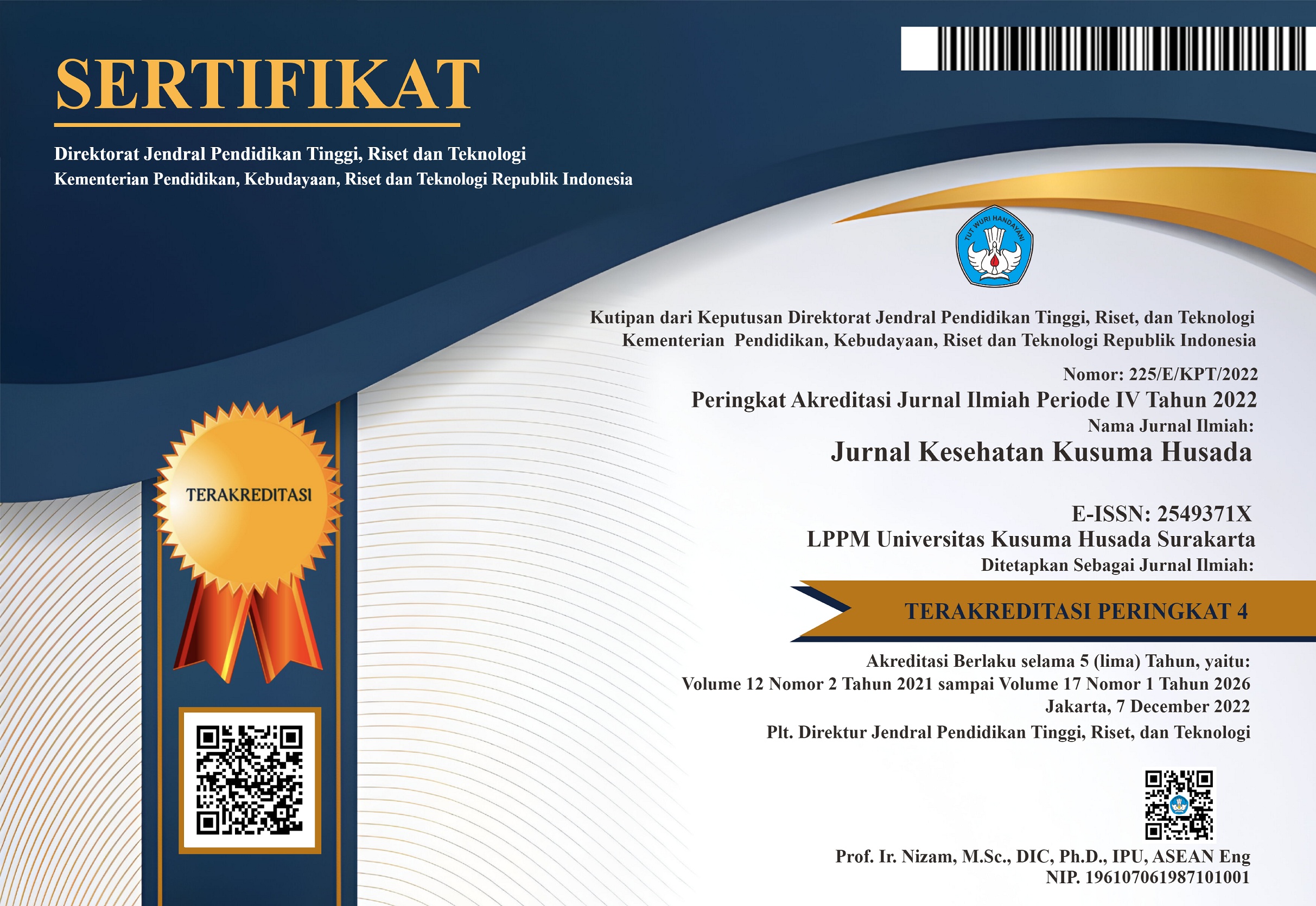PENGARUH TERAPI KOGNITIF TERHADAP PERUBAHAN KONDISI DEPRESI LANSIA DI PANTI WREDA DARMA BAKTI KASIH SURAKARTA
Abstract
ABSTRAK
Lansia atau usia lanjut merupakan bagian dari proses kehidupan yang tidak dapat dihindarkan dan akan dialami oleh setiap individu. Pada aspek kesehatan, peningkatan jumlah tersebut akan menimbulkan masalah, baik masalah fungsional maupun psikologi. Masalah psikologi yang lazim dan praktis ada pada lansia adalah demensia dan depresi. Pemberian terapi kognitif pada lansia diharapkan dapat beradaptasi dengan perubahan ¿ sik yang dialami sehingga ia dapat produktif dalam keterbatasan yang dimilikinya. Metode penelitian adalah quasi experiment dengan desain pre-post test design with control group. Data diambil sebelum dan sesudah pemberian intervensi terapi kognitif pada lansia yang mengalami kondisi depresi di kelompok intervensi. Cara pengambilan sampel adalah total sampling dengan sampel sebanyak 46 klien dibagi 2 yaitu 26 responden untuk kelompok intervensi dan 20 responden untuk kelompok kontrol. Instrumen penelitian untuk mengetahui kondisi depresi menggunakan kuesioner modi¿ kasi dari Test Skrining Depresi Beck (Beck Depresion Inventory/BDI) yang berjumlah 21 pertanyaan, dianalisis menggunaka univariat dan bivariat. Hasil penelitian menunjukkan penurunan kondisi depresi secara bermakna, baik pada kelompok intervensi maupun kontrol. Penurunan kondisi depresi pada kelompok lansia yang mendapatkan terapi kognitif menurun lebih rendah secara bermakna dibanding dengan kelompok lansia yang tidak mendapatkan terapi kognitif. Terapi kognitif direkomendasikan sebagai terapi dalam merawat lansia dengan kondisi depresi.
Kata kunci: lansia, depresi, terapi kognitif
ABSTRACT
Aging process is part of the process of life that can not be avoided and will be experienced by each individual. On the health aspect, an increasing number of elder people will cause problems, both functional and psychological problems. The common psychological problems in the elderly are dementia and depression. Cognitive therapy is expected to adapt to the physical changes experienced by elder people so they can still productive within their limitations.The research method is a quasi experiment with the design of pre - post test design with control group. Data were collected before and after cognitive therapy intervention in older adults experiencing depression in the intervention group. Sampling method using in this research is total sampling, with the total 46 respondents divided into two groups, 26 respondents for the intervention group and 20 respondents for the control group. Research instruments to determine the condition of depression using a questionnaire modi¿ ed from Beck Depression Screening Test ( Beck Depression Inventory / BDI ) which has 21 questions, with univariate and bivariate analysis.These results indicate a signi¿ cant decrease in depression conditions, both in the intervention group and the control group. Decline in the condition of depression in the elderly group who received cognitive therapy declined signi¿ cantly lower compared with the group of elderly who do not receive cognitive therapy. Cognitive therapy is recommended as a therapy in treating the elderly with depression.
Keywords: elderly, depression, cognitive therapy
References
Downloads
Issue
Section
License
The copyright of the published articles belongs to Jurnal Kesehatan Kusuma Husada.

This work is licensed under a Creative Commons Attribution 4.0 International License.
















